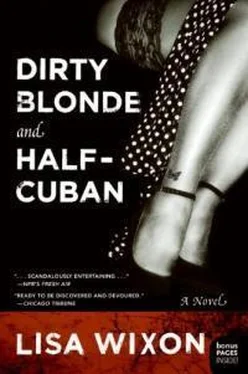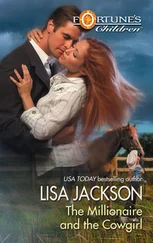Lisa Wixon - Dirty Blonde and Half-Cuban
Здесь есть возможность читать онлайн «Lisa Wixon - Dirty Blonde and Half-Cuban» весь текст электронной книги совершенно бесплатно (целиком полную версию без сокращений). В некоторых случаях можно слушать аудио, скачать через торрент в формате fb2 и присутствует краткое содержание. Жанр: Современная проза, на английском языке. Описание произведения, (предисловие) а так же отзывы посетителей доступны на портале библиотеки ЛибКат.
- Название:Dirty Blonde and Half-Cuban
- Автор:
- Жанр:
- Год:неизвестен
- ISBN:нет данных
- Рейтинг книги:4 / 5. Голосов: 1
-
Избранное:Добавить в избранное
- Отзывы:
-
Ваша оценка:
- 80
- 1
- 2
- 3
- 4
- 5
Dirty Blonde and Half-Cuban: краткое содержание, описание и аннотация
Предлагаем к чтению аннотацию, описание, краткое содержание или предисловие (зависит от того, что написал сам автор книги «Dirty Blonde and Half-Cuban»). Если вы не нашли необходимую информацию о книге — напишите в комментариях, мы постараемся отыскать её.
Dirty Blonde and Half-Cuban — читать онлайн бесплатно полную книгу (весь текст) целиком
Ниже представлен текст книги, разбитый по страницам. Система сохранения места последней прочитанной страницы, позволяет с удобством читать онлайн бесплатно книгу «Dirty Blonde and Half-Cuban», без необходимости каждый раз заново искать на чём Вы остановились. Поставьте закладку, и сможете в любой момент перейти на страницу, на которой закончили чтение.
Интервал:
Закладка:
It meant trouble, for sure, but she vowed to put feelings of guilt and regret on hold. Thinking that way, lectured the doctor, wouldn’t be good for the baby.
The baby.
She could barely contain her glee at mouthing those words, over and over, until she finally dressed and met John downstairs at the breakfast table. The house was bustling with gardeners and maids—the employees bestowed upon diplomats—and so she announced the news right there, to all of them, believing that in their presence John would opt for a reaction that would fall in line with his persona, one crafted to be career-advancement suitable. Calm, confident, and with all the emotional tremor of a flat line.
But that morning John broke the mold. Hugging his wife, with rare tears in his eyes, he ordered champagne to be iced, at seven-thirty in the morning, if only there was sparkling wine to be found in that Soviet-run city circa 1978. My mother searched John’s eyes for signs of cruelty, or at least irony, and, seeing none, realized John believed himself to have been capable of having children all along. That somehow he’d willed himself fertile.
But the excitement of impending fatherhood wore off quickly. After a few weeks, John again turned to a favored solace. His work. My mother was set adrift and left to deal with her pregnancy alone.
Not entirely alone.
The revolution had made a eunuch of the Catholic Church. Guilt about sex, extramarital or not, and its consequences, was eradicated along with the religion’s power. So it was no surprise that when my mother announced the news to José Antonio, he was nothing but thrilled.
“Is it mine?” he asked, his eyes shiny and hopeful.
“Honestly, I don’t know,” she replied.
“No importa.”Not important. “It’s part of you, and so I’ll love it.” And then he’d demonstrate yet again his affections for my mother. José Antonio continued doing so until just before she gave birth to a seven-pound baby girl in December 1978. Nearly a year after they’d begun their affair.
My mother had never known such happiness. The regret and guilt she’d promised to confront was pushed further down the pike, though she was aware of its existence. Like any bad debt, it was racking up high interest, and capitalizing.
As I grew, she became more brazen about her extramarital activities. Phrases like “going for a long walk” or “I’ll be at the market this afternoon” thinly disguised her time with José Antonio. Part of her hoped John would tackle her in the driveway and demand she return to him, return to them.But he never did. He let her walk out of the house with me in her arms and come home late in the day, each and every day, for nearly another year, saying nothing of my mother’s behavior.
Saying nothing.
41
F riday power lunchat The Grill, in one of the booths near the entrance, is the Hollywood equivalent of Saturday dinner, back of the room, at Havana’s El Aljibe.
Green tablecloths flutter in the breeze under the palm-thatched, open-air eatery. Recorded sonfrom Compay Segundo booms over speakers, and waiters command the affairs of the room in tuxedoed splendor.
Drivers zoom up a ramp to the maître d’station and drop their passengers. A cubanawith smarts has intentionally chosen a seat on the right side of the car, so that her practiced exit—in usual painted-on attire—is a choreographed effort in lissomness, as she’s aware her maneuverings are being witnessed over chicken à l’orange by every patron in the scrutinizing room.
Tables are scrummed together, and bodies in close proximity are electrified. Camila and Ignacio hold court in a coveted corner. Reinaldo and I exchange greetings with the couple and settle in. My friend wears a silk sheath in baby blue, and I’m in a pink spaghetti-strap tank and jeans. Reinaldo’s cross-and-savior tattoo peeps through a vintage rayon Hawaiian shirt.
I’m genuinely happy to see Reinaldo, who returned the day before, and just two weeks after our date at the Tropicana. Today, I’m optimistic about my chance to snare him long-term, and find myself relaxing in his presence.
My mother wrote in her diaries about having dined at El Aljibe with John. In the days before her furtive affair began, she’d often see José Antonio here, and they’d share a conspiratorial smile at the great fortune of having met, unexpectedly, yet another time. I look around the restaurant, wondering where they sat, and what they were wearing. Did José Antonio raise his glass in toast to her from across the tables? Did a humid breeze swirl around them, generating the kind of voltage palpable here right now?
But I don’t have time to contemplate the past, because I’m captivated by the present. A quick study tells me this is no ordinary restaurant, and I count three types of social arrangements prevailing at El Aljibe.
First and predominantly are aged and potbellied foreigners with cubanasin their teens and twenties, ranging in shades of skin from bitter mocha to the Madagascar orchid that produces vanilla. The generation gap may prove thrilling in bed, but the permanent silence between most couples says it doesn’t transcend into conversational efforts.
Several tables are filled with the second type: the wealthy and connected of enigmatic residency—diplomats and syndics and bureaucratic sycophants.
And the third type are emigrants who’ve returned home to shower their relatives with gifts and, in doing so, prove their foreign successes. These prodigal sons pick up the tab for ten or twelve with the affected casualness of one sporting a Red Sox cap at Yankee Stadium. Their families pretend in equal measure; pretend not knowing that in order to pay the bill themselves, they’d have to save one peso a day, every day, for twenty-eight years.
But it’s the demimondaines with their foreign boyfriends that most fascinate. Nature cannot explain these couples, though the bottles on the table will. At El Aljibe, when a bottle of wine or imported scotch is emptied, it’s not removed by waiters but, rather, left on the table as evidence of a diner’s wealth. In Hollywood, power lunch can be full of quiet anxiety in surmising the liaisons formed at other tables. In Havana, cubanasand foreigners, too, scan the room, their eyes lingering on tables sporting the most beautiful women and the most expensive spirits. Narrowed eyes wonder: Is my girlfriend as beautiful as that foreigner’s? Is my yumaas rich as hers? And thus the social scale is weighted and adjusted by everyone in the room. Malcontent is either buried or born.
Camila pours another glass of the Condado de Haza 2001 Ribera del Duero. Our table is littered with the $55 bottles. Camila whispers in my ear to stop looking around and pay attention to Reinaldo. I reach over, halfheartedly, and pat Reinaldo’s knee, but I miscalculate and smack his crotch instead. Reinaldo winces and Camila slinks into her chair.
It’s no wonder he’s sensitive. Upon Reinaldo’s return to Havana the previous night, we’ve had eight bouts of intercourse, though I use the term loosely, and he’s been threatening all evening that we’ll be “making love” yet again before we sleep. This isn’t your mother’s sex. This isn’t married-for-five-years sex, either. This is girl-on-top, thrash and wreathe and glissade—but no screaming, as Camila says it’s juvenile—while he lies on his back, hands clasped behind his neck, Christ tattoo bared, eyes rolling back in anticipation of his little death and the attendant resurrection. In the perversity of my recital, I feel pleasure myself and tell him he’s the greatest, the absolute best ever, that mine, too, is a rapturous release and may we thank the heavens together for our reunion. This is performance-art sex. This is jineterasex. This is how a cubanais supposed to fuck.
Читать дальшеИнтервал:
Закладка:
Похожие книги на «Dirty Blonde and Half-Cuban»
Представляем Вашему вниманию похожие книги на «Dirty Blonde and Half-Cuban» списком для выбора. Мы отобрали схожую по названию и смыслу литературу в надежде предоставить читателям больше вариантов отыскать новые, интересные, ещё непрочитанные произведения.
Обсуждение, отзывы о книге «Dirty Blonde and Half-Cuban» и просто собственные мнения читателей. Оставьте ваши комментарии, напишите, что Вы думаете о произведении, его смысле или главных героях. Укажите что конкретно понравилось, а что нет, и почему Вы так считаете.












